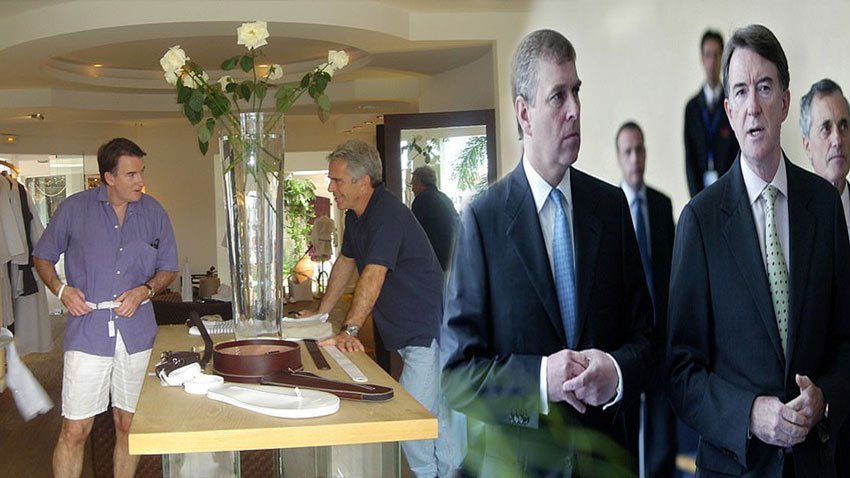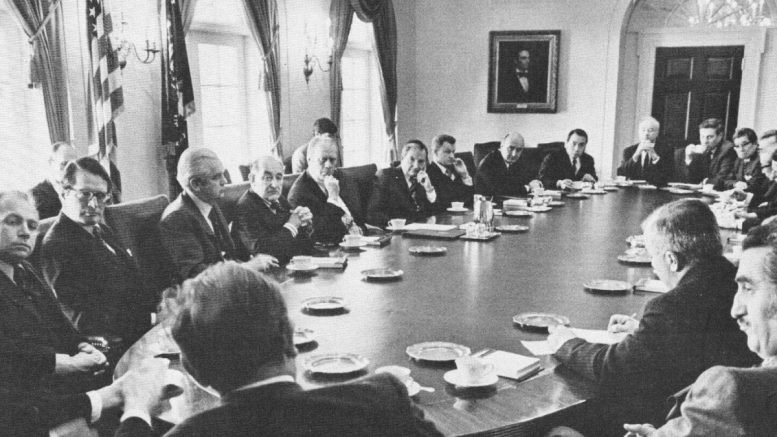The Global Chess Game: Trilateralism’s Last Gambit in an America First-World
In the grand theatre of global politics, sometimes the most telling moves are the ones that seem most absurd at first glance.
As the world braces for Donald Trump’s return to the White House, Britain prepares to send Lord Peter Mandelson, a major player and architect of globalisation, European project evangelist, Trilateral Commission member, and notorious friend of Jeffrey Epstein, to serve as ambassador to Washington.
If this doesn’t strike you as darkly comedic, you haven’t been paying attention.
The appointment would be more than merely ironic; it’s emblematic of a desperate establishment scrambling to maintain control as its carefully constructed world order crumbles.
When Patrick Wood and Antony Sutton published “Trilaterals Over Washington” in 1978, they exposed an ambitious project: the creation of a triumvirate of power linking North America, Western Europe, and Japan. Today, that project faces its greatest challenge not from the left as they always presumed , but from populist nationalism that threatens to tear apart the very fabric of globalisation. Now they scramble to hold onto their fading dreams.
Enter Sir Keir Starmer, Britain’s Prime Minister and fellow Trilateral Commission member, dispatching his ideological brother-in-arms to salvage what remains of the neoliberal dream. Mandelson – twice-resigned minister, friend to oligarchs, and nicknamed the “Prince of Darkness” – seems an unlikely choice for Trump’s Washington. But perhaps that’s precisely the point.
Consider the web of contradictions: A man who condemned Trump’s “America First” approach as bullying mercantilism, now potentially tasked with courting it. A steadfast advocate for closer ties with Beijing, headed to a Washington increasingly hostile to Chinese influence. A passionate Remainer and EU true believer, charged with securing Britain’s post-Brexit future. The contradictions would be amusing if the stakes weren’t so high.
But the real story isn’t about Mandelson’s past connections to that other infamous trilateral commission member friend of princes and Peter Mandelson alike, Jeffrey Epstein (though these raise troubling questions), nor his advisory work for Chinese corporations through Global Counsel. It’s about what his potential appointment represents: the last gasp of a globalist order that has consistently prioritised the free flow of capital over the welfare of citizens.

Noam Chomsky’s critique of the Trilateral Commission becomes increasingly prescient. The organisation’s infamous 1975 report on the “Crisis of Democracy” revealed their true concern: not that democracy was failing, but that it was working too well, allowing ordinary citizens to make demands that threatened elite control. Today’s “crisis of democracy” looks rather different – a revolt against the very institutions and policies that Mandelson and his ilk championed.
The stunning irony is that the same establishment that lectured the world about democratic values now seems perfectly comfortable sending a member of their globalist club – one who voted against recognising genocide in Xinjiang – to represent British interests in Washington. The message couldn’t be clearer: principles are flexible when power is at stake.
However, for Mandelson to make progress, Trump would have to forgive him for condemning the past and future president’s America First approach to trade in a 2018 article.
In the piece, the peer said it was “necessary to recognise Mr Trump’s behaviour for what it is: he is a bully and a mercantilist who thinks the U.S. will gain in trade only when others are losing.”
But perhaps the most telling aspect of this saga is what it reveals about the contemporary elite’s worldview. In their minds, the great game of global power can still be played by the old rules – where a well-placed phone call, a private dinner, or a backroom deal can smooth over any ideological divide. They seem not to have noticed that the game board itself has changed.

As Trump builds his cabinet with China hawks like Marco Rubio, and as American politics becomes increasingly hostile to globalist sensibilities, the notion that Mandelson could effectively bridge these worlds seems increasingly fantastic. Yet the very fact that this appointment is being seriously considered reveals how desperately the old guard clings to power.
The question we should be asking isn’t whether Mandelson can succeed in Washington, but rather: In whose interests would he truly be working? The British public he despises? The European project he clearly adores? Or the transnational elite whose interests he has spent a lifetime advancing? I know where my money is…
In the end, this potential appointment represents more than a diplomatic posting – it’s a litmus test for our times. Can the architects of globalisation adapt to a world increasingly sceptical of their project? Or are we witnessing the last moves of a game that’s already been lost?
As the world order fragments and realigns, one thing becomes clear: the old playbook of Trilateralism – with its assumption that what’s good for global capital is good for all – faces its greatest challenge yet. Whether Mandelson goes to Washington or not, the bigger question remains: Can the globalist elite adapt to a world that increasingly rejects their vision, or will they, like the aristocracies of old, cling to power until reality forces their hand?
The answer to that question will shape not just Anglo-American relations, but the future of global democracy itself.
Before you go, I have a big favour to ask. Please consider making a small donation. Our year-end hosting contract is up next week, and it’s a significant expense. Thanks to our incredible readers, we’ve managed to stay online for the past 7 years. But, like many independent sites, we’re facing increased challenges and censorship, especially as a left-leaning platform. Any amount you can give would mean the world to us. Thank you!
Donate below, please.
Support Independent Journalism Today
Our unwavering dedication is to provide you with unbiased news, diverse perspectives, and insightful opinions. We're on a mission to ensure that those in positions of power are held accountable for their actions, but we can't do it alone. Labour Heartlands is primarily funded by me, Paul Knaggs, and by the generous contributions of readers like you. Your donations keep us going and help us uphold the principles of independent journalism. Join us in our quest for truth, transparency, and accountability – donate today and be a part of our mission!
Like everyone else, we're facing challenges, and we need your help to stay online and continue providing crucial journalism. Every contribution, no matter how small, goes a long way in helping us thrive. By becoming one of our donors, you become a vital part of our mission to uncover the truth and uphold the values of democracy.
While we maintain our independence from political affiliations, we stand united against corruption, injustice, and the erosion of free speech, truth, and democracy. We believe in the power of accurate information in a democracy, and we consider facts non-negotiable.
Your support, no matter the amount, can make a significant impact. Together, we can make a difference and continue our journey toward a more informed and just society.
Thank you for supporting Labour Heartlands









